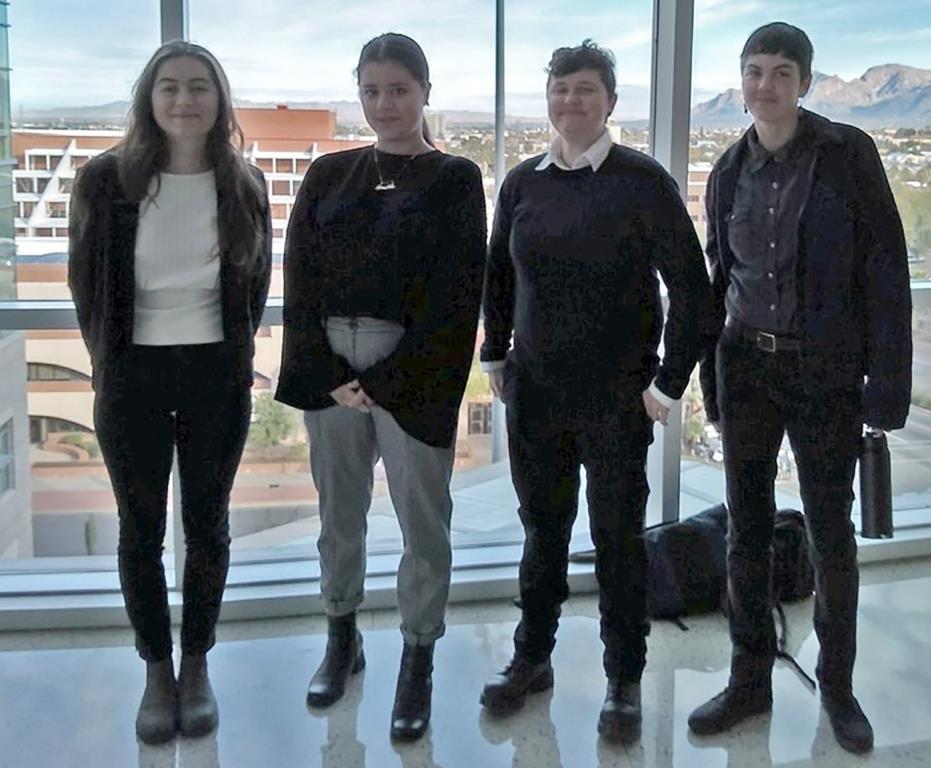“Humanitarian Aid Cannot Be Criminalized”
We speak with one of the No More Deaths volunteers who faced trial for helping save migrants’ lives.

No More Deaths volunteers Madeline Huse (left), Natalie Hoffman, Oona Holcomb, and Zaachila Orozco. Photo courtesy of No More Deaths.
In August 2017, Madeline Huse and three other volunteers of the Tucson-based organization No More Deaths entered the Cabeza Prieta National Wildlife Refuge in Arizona to deposit jugs of water and cans of beans near various pathways. The massive park—close to 900.000 acres—is located within the Sonoran Desert, west of Tucson, and stretches along more than 50 miles of the US-Mexico border. It’s a heavily trafficked migrant route where dozens of people have died of thirst and hunger in recent years.
Huse and the others’ act of kindness led to a drawn-out legal process. In March 2019, the four volunteers were sentenced to 15 months probation and a $250 fine for entering the refuge without a permit and “abandoning property.” Despite the ruling against them, the volunteers remained defiant. “The border crisis in this country is a matter of life and death,” Huse said in a news release following the sentencing. “History will not favor those on the wrong side of it.”
Their conviction was part of a legal crackdown on volunteers and activists who work to save migrant lives in the treacherous borderlands. In January 2018, Scott Warren, another No More Deaths volunteer, was arrested and charged with a felony for giving food and water to two migrants in the same area. After a first trial led to a jury deadlock, Warren was acquitted of all charges in November 2019.
Three months later, a federal court also overturned the convictions of Huse and the other three volunteers. Judge Rosemary Márquez of the US District Court in Arizona ruled that the actions by Huse and others in support of migrants were motivated by religious beliefs and had not violated federal law. “The depth, importance and centrality of these beliefs caused defendants to restructure their lives to engage in this volunteer work,” Judge Márquez said her ruling.
The judge “also appeared to rebuke federal prosecutors for trying to argue that leaving behind food and jugs of water in the desert would have the effect of encouraging more migrants to cross the border,” the New York Times reported. “Judge Márquez said prosecutors appeared to be claiming that without clean water and food, there would be more deaths and therefore fewer people willing to cross the border illegally. ‘This gruesome logic is profoundly disturbing,’ she wrote.”
“Judge Márquez’s ruling was a win for the movement, and proof that humanitarian aid cannot be criminalized,” Huse, who is 24, told me when I spoke with her in May. “Personally, it was also a pleasant surprise.” The 2019 trial had left Huse and her codefendants appalled at the U.S. justice system. “If one thing became clear to us, it was the sheer brutality of the justice system. Although we were only four volunteers tried for ‘abandonment of property’—essentially littering—the government came at us viciously and vigorously, armed with a lot of resources. The whole thing felt a little silly at times. It certainly made me realize how flawed the justice system can be.”
Huse first got involved with No More Deaths in 2016, not long before the elections. “It was a turbulent time on the border,” she told me. “I’d been working for farm workers’ rights in Washington state for a few years and wanted to go south and see what it was like down there. After two months in the desert with No More Deaths, I worked with the South Texas Human Rights Center. Then in 2017 I was appointed as Logistics Coordinator for No More Deaths. It was a six-month rotating position in which I learned a lot.”
Going through the trial had a positive side as well, she said. “The best part about it was that we felt sure of our actions and had the support of the community. On the third day of the trial, we each received a hundred letters of support from around the country.”
Huse is back in Washington, studying for a degree in human services with a focus on conflict analysis and resolution. Last year, she was certified as a mediator. “I would like to work with small activist organizations that find themselves at an impasse. Because many of them are run by volunteers, there is a high risk of burnout and similar issues. Professional mediation can often help them move forward.”
Asked if, after having gone through the trial, conviction, and appeal, she would she do it again, she doesn’t hesitate for a moment: “Absolutely. I plan on going to Tucson and working with No More Deaths many more times in my life.”












